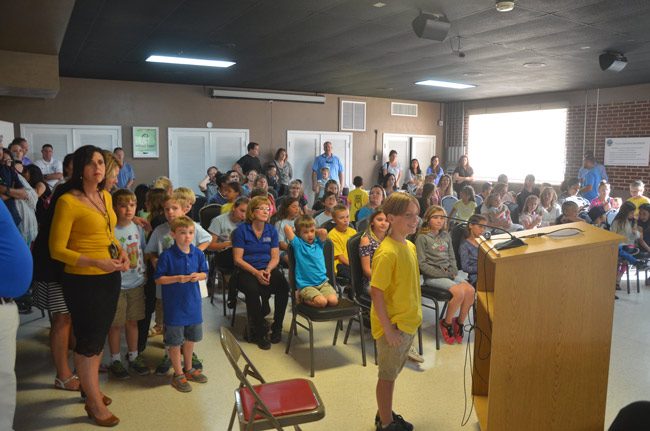
It’s not often that the Flagler Beach City Commission packs its chambers. When it does, it’s usually because of controversy—a dreaded ordinance, an unwanted development, a protest.
Not Wednesday.
Mayor Linda Provencher’s town hall drew a standing-room-only crowd, with every seat filled by children, most of them involved in Old Kings Elementary’s Future Problem Solvers program, which is in its inaugural year. The students were there to learn about local government and let the city commission know of their concerns and suggestions on improving the city’s and beaches’ environmental stewardship. Provencher had organized the evening with just that in mind, dubbing it a Kids’ Town Hall. It was unprecedented, and remarkably lively.
With the help of a small group of civic activists who call themselves the Flagler Beach All Stars—Eric Cooley, Carla Cline and Provencher herself (their logo is “Using my powers for good not evil”) what she feared was going to be a marginally attended event turned into the packed house that it was for an hour. It may not be the only such meeting of its kind. Cooley, who owns the beachside 7-Eleven in town, said the evening’s discussion will be turned to actionable initiatives the students and the commission can word toward. And it’ll do what the town hall was intended to show the younger people: that government powers, too, can be used for good, and that engaging city commissioners can have the desired results.
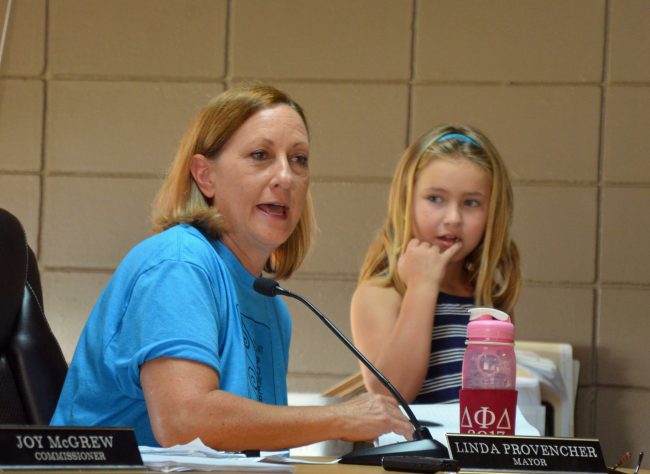
The students had the right audience. Four of the five city commissioners turned out and took their seats on the dais, so did City Manager Larry Newsom, Fire Chief Matt Doughney, Fire Chief Bobby Pace and Parks and Recreation Director Tom Gillen. The students, ranging from second to sixth graders, came prepared not only to talk about some of their futuristic concepts, such as a mechanized “fish” that could scour the ocean for microplastics and vacuum them up, but with pragmatic ideas—and requests—the city could realistically implement, from bigger, lidded trash and recycling cans on the beach to rebuilding the volleyball nets in city parks to more dune protection.
At one point a girl who couldn’t have been older than a second or third grader challenged the commissioners with the sort of question they’re more familiar with during election campaigns: “How are you making Flagler Beach better?”
Provencher spoke of the monthly beach clean-up that she participates in, inviting students to join her. And she asked them what they wanted the city to do for them.
“The point of this right here was to change Flagler Beach,” Cline said. Flagler Beach is functioning and solving problems, but the thought was, if the kids started to realize that they are looking for ways to improve it, then that’s how it will change.”
So the town hall toggled between quick takes from students describing one environmental problem or another to others proposing immediate ways to manage or reduce those problems (conserving water and gas, using less plastics) to direct suggestions (stop throwing trash on the beach, ban plastic bottles, exile teen-agers). One girl even asked: why can’t Flagler Beach make bicycles and kayaks available for borrowing, to people who don’t have them? It’s not a crazy idea at all: Paris and New York, among other cities, already offers bicycles for rent at street corners, though no such kayaks have been spotted on the Seine or the Hudson.
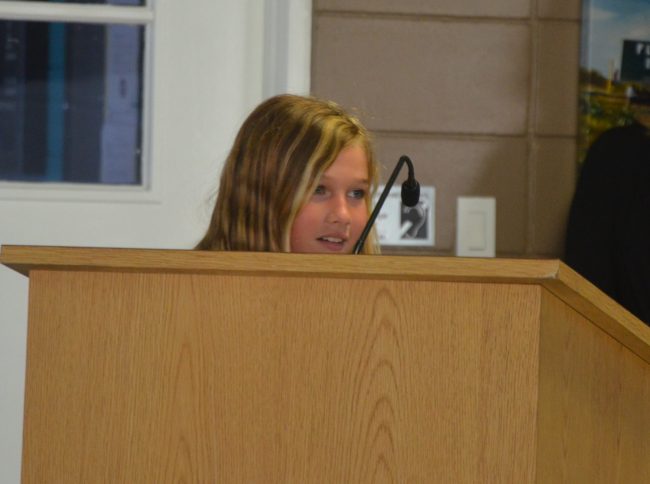
7-Eleven took a bit of a beating too (those plastics, those teen-agers), but Cooley, challenged the students: “For all the kids, if you go into the 7-Eleven and you want to get a free drink or a free slurpy, you ask for a small bag or you can get a big bag, whatever size you’re comfortable with. And if you go out to the beach and you pick up trash and you bring it back in the store, you can get a free drink, whatever size bag you’ve got, any time.”
Commissioner Joy McGrew threw down a challenge of her own: “Design us a garbage can that can go on the beach, be attached to the walkovers, made out of a product that salt water doesn’t necessarily destroy, have a way to get stuff into it, and a way for our workers to get stuff out of it.” Moments later, she cautioned the students about their antipathy for teenagers, asking how many of them plan on being teen-agers one day. Most hands went up.
“I don’t want to grow up,” one girl yelled out.
“I don’t either,” McGrew said. But, she said, “you also, all of you, moms dads and all of you, have an opportunity to grow up and do really good things. You can sit up here in one of these big chairs like we do. You can own a store like Eric does, the 7-Eleven. You can be the police chief, you can be the fire chief, you can be anything you want to, and you all have shown us tonight that you are thinkers and that you care, but you’re also going to grow up and be a teen-ager and fall in that abyss, so just remember, don’t throw out that bottle.”
Commission Chair Jane Mealy, herself an educator, apologized for being “the bummer of the group,” noting that for all the many good ideas, at times—as with a ban on plastic bags, which the city had once considered—it’s the state Legislature that intrudes and forbids localities from doing what they would like to do. Even if it’s an environmentally sound idea. “Our hands are tied sometimes,” Mealy said.
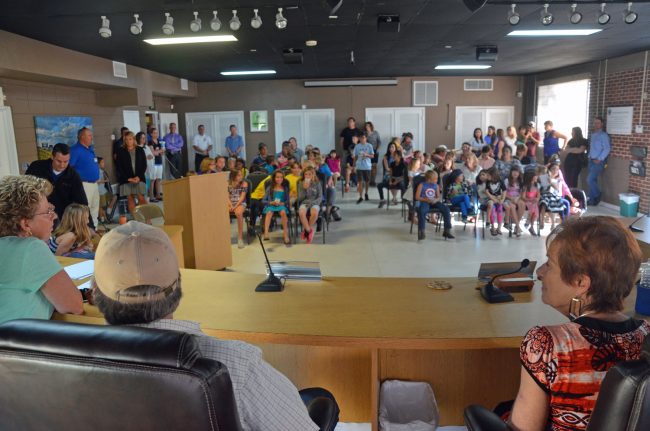
The students themselves held the floor most of the time, several of them taking multiple turns at the podium, whose mike most of them had to strain to reach. (Old Kings Assistant Principal Nick Schell, who happens to be a Flagler Beach resident, was there at every step to help.) They were the product of a Future Problem Solvers program coached in its first year by teachers Ellen Asher and Katie Monsanto, one of whose aims is to create links between the students’ ideas and what can be done at home, environmentally, down to a day-to-day calendar for April, when Earth Day falls: reducing one’s shower by two minutes to save gallons on one day, avoiding non-decomposing gum on another, donating food to the local pantry on another, and so on.
“It’s a nice home-school connection,” Asher said, “because when you get parents involved like that they really do become vested and it also gives them information that a lot of adults don’t necessarily have. And it’s a nice bonding experience for their kids and their families.” Many of Asher’s students sported yellow shorts with a logo and the tagline, “Dr. Asher’s Solar Engineers,” signaling another focus of the program this year (Asher got her doctorate in education in August).
Provencher was “overwhelmed” by the turnout, she said. “I was thinking maybe 10, 15 kids” would show up. Not a roomful. It may not be the last such town hall.
“We’re actually going to have tangible results for them to look at,” Cooley said—for both the students and the city commission.
![]()
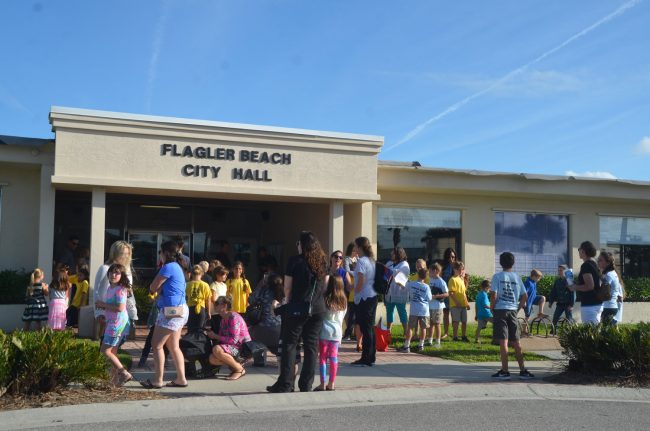





























Lazaruis says
HA
YOUR 5TH GRADER IS SMARTER THAN MY COMMISSIONER !!
WE CAN LEARN FROM MANY PEOPLE , EVEN SMALL ONES .
Layla says
Outstanding!
tulip says
What a wonderful idea and hope more of those town hall meetings will be held. Children are our future and have the capability of forward thinking fresh ideas and an interest in participating in projects to make things happen. What a great way to stimulate their brains into thinking good, productive thoughts and having experienced adults with open minds guide them.
It must have been great listening to all the ideas and particularly the enthusiasm. Those things you don’t normally see at meetings.
Carol Fisher says
Such and amazing “good news” story! Thank you Flagler Live and Pierre Tristam for this great story! Thank you Linda Provencher, Eric Cooley, Carla Cline, and all the Flagler Beach City Commissioners who attended. I sincerely hope this event is repeated.
Joan says
Wonderful! Educating and empowering the next generation!